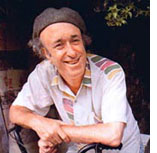By Dan Bloom

CHIAYI CITY, Taiwan — Ivo Lederer was a refugee in a group of European Jews given special passage by ship to the United States by President Franklin D. Roosevelt during World War II, and he later went on to became a well-known Russian and Eastern European scholar in America. He also gave the world a rather special literary gift — his son the Berlin-based writer Michael Lederer.
I recently saw Lederer fils on a German TV interview show, speaking in English with the show’s British host Robin Merrill. Fascinated by the American author’s colorful life and new novel, Cadaques, I reached out via the Internet and asked if we could chat a bit about life and literature.
Graciously, Lederer wrote back to me here in Taiwan and told me some of the background to his late father’s rather unique voyage to and arrival in America.
He told me his father was born in 1929 in Zagreb, Croatia. and was 11 when the Nazis invaded, with his grandfather arrested for defying a ban against Jews practicing law.
However, as luck would have it, or by the grace of God, the Lederer family was able to flee to Italy using false papers to get across the border. There, with the help of friends and people in the Catholic Church, they lived in hiding for three years.
Later, the Lederers boarded the ‘Henry Gibbons‘ a Liberty ship dispatched by Roosevelt to transport wounded soldiers and 982 refugees, mainly Jews. They set forth on a new adventure and sailed from Naples to New York.
Fast forward to 2014. Michael Lederer, 58, lives in Berlin and is preparing to publish a new novel — just completed and being edited and prepared for publication as you read this — titled Don Quixote Saves America.
More on the new novel later, but first I wanted to find out how the ever-wandering Michael ended up doing an interview in English on a German satellite TV network broadcast worldwide.
“The TV program that you watched in Taiwan was taped in August 2014 in Berlin and first aired in early October,” he told the San Diego Jewish World. “It is still available online, at both the Deutsche Welle website and on YouTube. The producers of the show knew about me through the U.S. Embassy Literature Series here in Berlin, and I got an email from them requesting the interview. I’m glad you saw the show and wrote to me across the seas.”
I wanted to know what had brought him from his earlier life in America to life now as an expat in Berlin, where has resided for over ten years.
“I lived in London as a student of theater in the early 1980s, after college in New York,” he said. “Later, I lived in fishing village in the south of Spain in the mid-1980s. I also have lived in Vienna, London, Berlin, Warsaw and Dubrovnik. I am still an American, I just sleep and eat in other places.”
In Berlin, Lederer lives with his second wife, a Polish-born woman, and works on his writing every day.
“Here in Berlin, I am a member of the Kunstlerhof group,” he told me. “We are painters, writers, sculptors and musicians sharing an old factory space in Berlin. They say that misery loves company, so does joy. At this point in my life I am very happy man and writing novels one after the other.”
I asked Michael what his new novel is all about.
“Without giving away too much of the plot, I will say that the question of solar energy plays a big role in the story,” he told me, knowing of my own interest in ”cli fi” and global warming issues. “Because if we hope to leave this place intact for our great grandchildren, and someday their great grandchildren, we need to act beyond mere thoughts of the next electoral cycle or accounting quarter. Our better instincts can maneuver ahead while our lesser instincts are inclined toward crash and burn. It’s our choice which path to take, and that choice has to be made very soon.”
Don Quixote Saves America tells about an older man who lives on a broken-down houseboat in California and who reads Cervantes’ famous novel Don Quixote and then decides that just like the knight in that book he will venture forth to “banish evil from the land, Michael told me.
“In his case, that involves driving across America in an old car he rechristens Rocinante,” he added. “He picks up a young hitchhiker he insists on calling Sancho, and together those two set out to ‘get America back on her feet.’ Miguel de Cervantes was 58 when he wrote the first part of his ‘Don Quixote’. I am that same age now.
*
Bloom is a freelance writer based in Taiwan and an inveterate Internet surfer. He may be contacted via dan.bloom@sdjewishworld.com